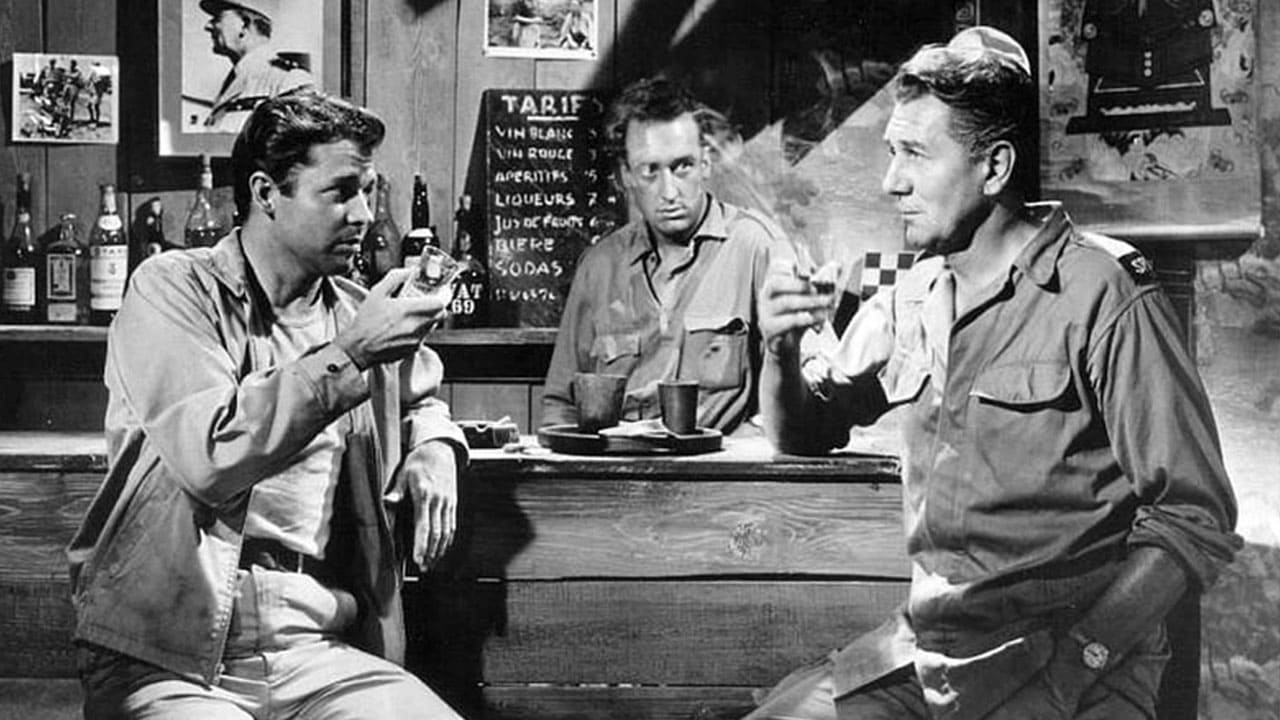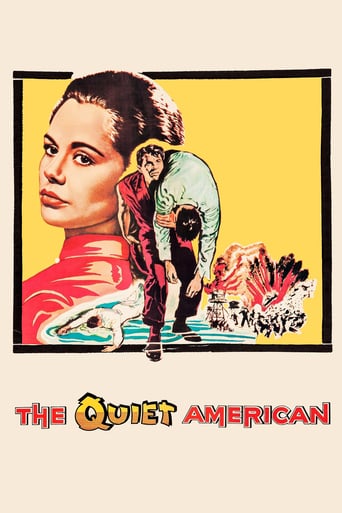



What makes it different from others?
good back-story, and good acting
Blistering performances.
Worth seeing just to witness how winsome it is.
While I'm familiar with the name Graham Greene I've never read one of his books. Of his works the only one I've ever seen was THE THIRD MAN for which he wrote the screenplay based on his own novella. So when I took to watching this movie I was interested to see what I'd make of it.The story is more romance than spy story though it has elements of both. It takes place in the mid-fifties in Vietnam, a country poised on the brink of war and being tugged at both ends by different political factions. The tale is told through the eyes of British foreign correspondent Thomas Fowler (Michael Redgrave), a world weary reporter who's seen it all and has little hope for peaceful solutions.Fowler lives in an apartment with his companion Phuong (Giorgia Moll), a young Vietnamese girl who hopes to accompany him when he returns home. Fowler has told her that when he does so he will divorce his wife and the two of them will live together but the reality is that his wife, a devout Catholic, is unwilling to give him a divorce.Into their lives enters Alden Pyle (Audie Murphy). Pyle is unnamed in the movie but named in the book. Pyle supposedly works for an import/export business in town but in reality is an agent of the CIA. Dedicated to his job and believing that there is a solution to the problems in the country, he befriends first Fowler to learn more and then becomes enamored with Phuong. While Fowler has no real intention of taking Phuong with him, he finds himself insanely jealous of the attention Pyle shows her.Parts of this are interesting to watch as the two men discuss their intentions and Phuong not necessarily as a human being but as something they can barter over. Both have different beliefs about her, Fowler that she will just go along with the political climate offered here and Pyle that she can become an American with a sympathetic lifestyle. Her attitude towards it all is simple, she just wants to leave the country and go somewhere that has more opportunity. Eventually the romantic triangle must find a solution.Just how far Fowler is willing to go to put an end to his potential rival becomes a big part of the third act of the film. Midway through the pair find themselves stuck in a watchtower and have time to discuss their differing political views. Ever the cynic Fowler finds Pyle to be naïve rather than informed. None of it bodes well for Pyle.The film was supposed to be an anti-war piece but was twisted during production. Much of that revolved around the fact that this was during the blacklist period of Hollywood and the fear was it would be construed as a pro-Communist film. One thing it did so was predict the difficulties that would take place in Vietnam in years to follow. While a critical success it wasn't a huge hit at the box office.I think part of the reason for this was the structure of the film. It plays like a book and at times can be overly wordy. With little action to be found the movie crawls at a snail's pace while we wait to see what happens. Murphy was a star by this time, a decorated WWII hero who was known to play in westerns. This was a change of pace and it may have confused movie goers at the time. Still it makes for an interesting look at a topic rarely covered this way when it comes to Vietnam.Twilight Time provides the standard great looking picture with this release but few extras. All you will find here are an isolated music track with some effects and the theatrical trailer. But if interested make sure you pick one up before they're gone as the standard 3,000 copies have been made for release.
View MoreThe Quiet American (1958)I think this is an extraordinary film. At the time, Americans didn't like it because it made them look bad, and the writer of the book it is based on, Graham Greene, didn't like it because it changed too much of his anti-American plot. But as a film, whatever its blurring of truth to history, is true about human nature. The credit for this goes not only to Greene, the enormously gifted writer and co-screenwriter, but also to the director, one of the lesser known American masters at telling a romantic story, Joseph L. Mankiewicz, who also helped with the screenplay. The two are a perfect match, really, because both are all about subtlety and observation. Greene in particular has a way of bringing up the biggest issues in the most intimate and delicate ways, never grandiose, always psychologically sharp. And that is carried forward here in Vietnam a decade before the American War of the 1960s. The Communists are already fighting in the north, the French are getting ready to abandon the country to the Americans, and a British reporter is the center of our attention, not quite on anyone's side.There are two key characters, the reporter played with astonishing depth and acumen by Michael Redgrave, and "the American", played toward a caricature by Audie Murphy, with enough twists to his character to avoid over-stereotyping.Greene's observations of American do-good naiveté are fascinating, and the way this gets mixed (poisoned) with American meddling and military subversion is way ahead of its time. Or is it? It might be simply observant of the facts in 1950s Vietnam. Greene was a reporter himself there then, and after this book was published he was followed by American Intelligence until his death in 1991. One of the brilliant aspects of this movie is how it is not simply a love story, but has a trenchant, disturbing comment to make about world affairs, from the inside.Still, love intrudes, and the crossed loves of the two men for the same young Vietnamese woman is less clichéd than you might expect. The story is moving without being sentimental. And all of this is layered up with the actual Imperialist/Colonialist facts of the time. The conflicting sides of a war that few really understood (it seems) until twenty years later are here in their full formed germinations. Unlike the Michael Caine version of the same story (from 2002), this one was made before history had unfolded. It's endlessly almost chillingly fascinating, even though Greene's anti-war (and somewhat anti-American) tone was largely removed. The later movie might be closer to the book, but it feels like a movie made about history, not one that predicts it. There are some scenes here, priceless ones, shot in Vietnam in 1958, the rest is done (with terrific light and set design) in an Italian film studio. Greene was British and the production Italian, but Mankiewicz was American, and fully steeped in American filmmaking and myth making. It's this last aspect that is key--the movie is made to the highest standards of 1940s American melodramas, even having an echo (in terms of light and drama and style) of William Wyler's "The Letter" also set in Southeast Asia. The filming is astonishing--the photography is in the hands of Robert Krasker, who shot "The Third Man" and "Brief Encounter" to give you an idea of the moody richness of his style. And as a melodrama it comes down to the crumbling personal world of Fowler. At the end, in the busy night streets of a chaotic Saigon, he says, "I wish there was someone to whom I could say I'm sorry." I found it the final moving, beautiful strain of truth and pathos in a very special movie.
View MoreLike some other Joseph L.Mankiewicz movies,this is an investigation.The form recalls "Barefoot contessa" which began with the heroine's funeral and was a long flashback .But ,by and large,"Suddenly last Summer " ,the follow-up,was also an investigation (by a shrink)If we forget "guys and dolls" these are three investigations in a row.And anyway ,what are "letter to three wives" or "people will talk"? The plot is complex,and I must admit I do not find it as palatable and as accessible as most of Mankiewicz's works,which,although very talky,manage to remain absorbing till the last pictures : all in all ,all Mankiewicz movies look like filmed stage productions from "All about Eve" to "the Honey pot" and from " a letter to three wives " to " Sleuth" Even a work like "Cleopatra" features more intimate scenes than in an usual epic.The cast,for the first time in Mankiewicz 's canon (it never happened again),is weak:only Redgrave is convincing.Audie Murphy is a wooden actor(but we will not forget he was a hero in real life) and Italian Georgia Moll was a starlet who got lost in two-bit spy thrillers or sword and sandals in the sixties :why an Italian by the way?Just compare this acting with those of" Suddenly Last Summer" ! or "the honey pot" and I won't even mention "All about Eve".The plot mixes politics,economics and love affairs.The center of the story is a simple question of vocabulary:the meaning of the word "plastic" (explosive or plastic to make toys?)It leads the hero (who is not a nice person anyway:it's a cynical man getting old who cannot forgive the American his idealism )into a crazy spiral.He's been manipulated just as Mrs Holy,her son and the shrink were by Mrs Venable (Suddenly last Summer) or the guests and even McFly by Cecil Fox(The honey pot) .In "Sleuth" probably Mankiewicz's pinnacle ,Wyke manipulates Tindle and vice versa.In Mankiewicz 's best works ,people work behind the scenes (Cousin Sebastian in "Suddenly Last Summer" Cecil Fox after his death in "honey pot" and the most important scene in this film -the murder- which we do not see!!-And when they take the stage,they are wearing masks ("Sleuth")
View MoreThe Quiet American has a lot to live up to, because it is adapted from possibly the best book that Graham Greene ever wrote. However, it is a very well made and literate film which manages to make a reasonable stab at living up to the forbidding reputation of its source material. Audie Murphy gives a career-best performance as the title character, an American living in Vietnam during the French incursion into the country. He believes that he can make a difference by providing funding for arms, but his political and economic beliefs often lead to death and destruction. A British journalist named Fowler (Michael Redgrave) befriends him, but soon their friendship is damaged when the young American has an affair with Fowler's Vietnamese mistress. In the end, Fowler ponders whether to betray the American to his enemies as an act of revenge for what the American has done to his love-life. The film is powerful, absorbing and well-acted. It perhaps could be criticised for the extraordinarily high amount of dialogue (it's one of those films where if you stop listening for 30 seconds, you'll lose the plot) but that is probably the only true weakness. The themes of betrayal, colonialism, and the wisdom of interfering in the affairs of other nations, are handled thought-provokingly, and the moral dilemma facing the characters at the end are emotionally shattering. Redgrave gives a great performance, conveying the pain of his dilemma with aching conviction.
View More